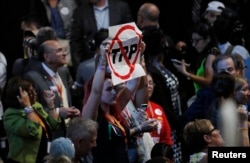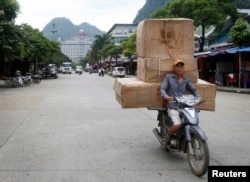For the United States, Vietnam has been a poster child for how economic bonds can rise out of the ashes of war, but now the tumult of 2016 has brought uncertainty to the two countries' trade relations.
Nothing symbolized that more than the Trans-Pacific Partnership. Vietnam had pinned its hopes of prosperity through trade on TPP. After Washington spurned the trade deal, though, Hanoi had to regroup. But instead of staking out a firm position, Vietnam seems to have adopted an attitude that TPP is both alive and dead.
Earlier this year, the country was pushing full speed ahead with TPP preparations until U.S. presidential candidates Hillary Clinton and Donald Trump made clear their enmity for the accord. Then Vietnam did an about face, pulling TPP approval from its parliamentary agenda.
Vietnamese leaders stopped gushing about the 12-nation trade agreement and shifted focus to other deals. And yet TPP hopefuls haven't gone silent.
"I think TPP is another vehicle to bring benefits to both countries," Nguyen Duy Binh, CEO of logistics firm Saigon Express Forwarding Corporation, said Tuesday at the Vietnam-U.S. Friendship Association's trade conference in Ho Chi Minh City.
Comments from him and other speakers showed that people are still talking about TPP, even if the Pacific pact could be on its last legs. Binh says his business would be fine without it, but thinks the U.S. could come back with a modified TPP.
"Not only Vietnam, but the whole world is thinking about the new administration in the U.S., and how it'll impact their economic outlook," he said.
Diversifying
Vietnam shouldn't be relying on one trade option anyway, said Pham Phu Ngoc Trai, chairman of Global Integration Business Consultants. The Southeast Asian country has long made a point of diversifying its foreign policy so as to do business with a variety of nations. Some saw TPP as a possible way for members to choose the U.S. over China, which is not a TPP member. If Hanoi made that choice, it didn't seem to pan out, as Washington pulled back from the trade deal.
Trai said Vietnam has other concerns. TPP would have been nice, but the country needs to figure out how to mitigate its trade imbalances with China, India and Japan, he said.
Still, Mary Tarnowka, U.S. consul general in Ho Chi Minh City, argued that the economic link between her country and Vietnam "has never been stronger."
American shoppers scoop up more Vietnamese goods than do any other citizens, while Vietnam is importing U.S. goods at a faster rate than any other country.
That's a far cry from the 1990s, when a U.S. postwar embargo was still undermining Vietnam's economy. Washington did away with the embargo in 1994 and signed a trade agreement with Hanoi in 2001. But even then, Vietnam was not out of the woods, according to Le Quoc An, head of the advisory board at the Vietnam Textile and Apparel Association. He said the U.S. threw up garment quotas soon thereafter, responding to the influx of shipments from Vietnam.
"The U.S.-Vietnam trade relationship has gone through a lot of turbulence," An said.
Today the waters are calmer, as seen from both sides of the Pacific, with quotas and tariffs coming down. But Vietnam is not as sure about the trade horizon as it wants to be, at least for now while the U.S. undergoes a White House transition.






